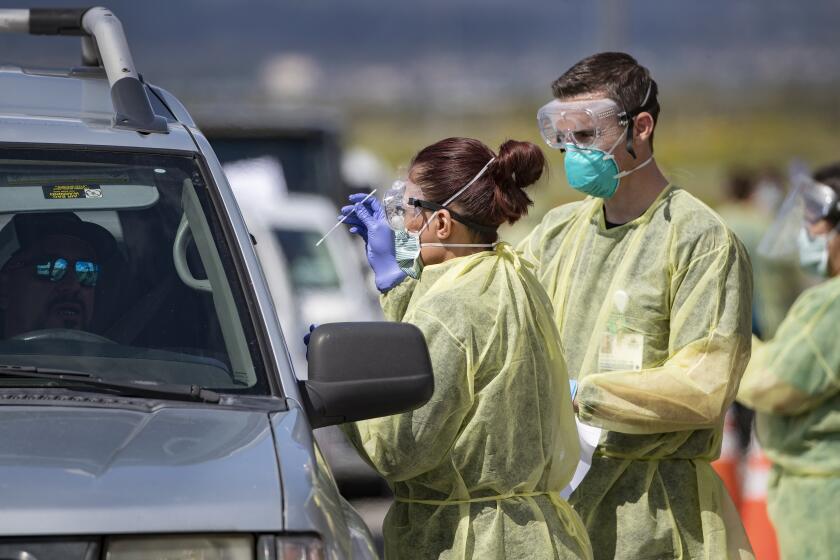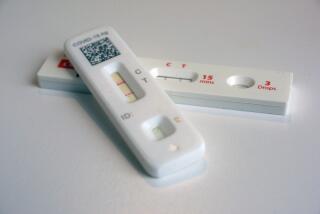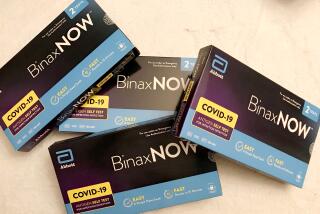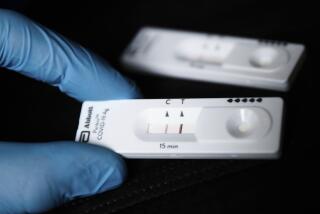Coronavirus testing hits another snag as labs need emergency funding to meet high demand
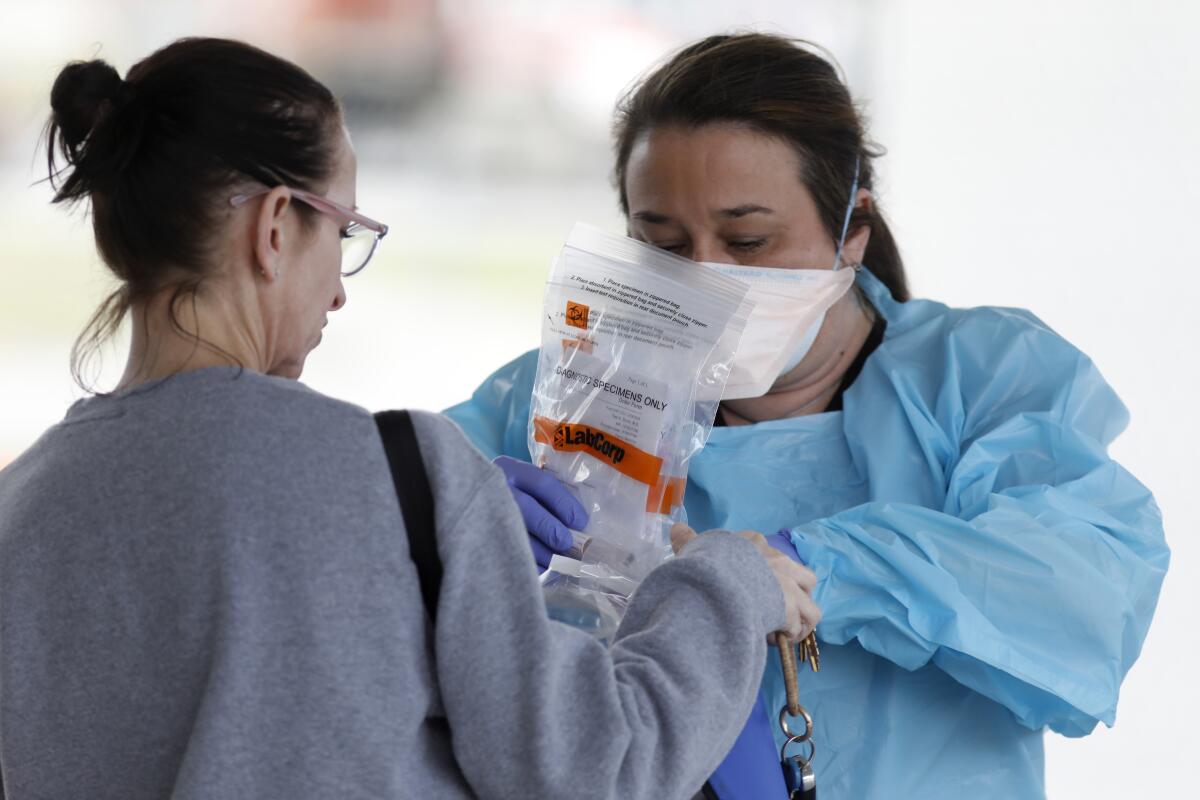
- Share via
One week after the Trump administration promised a massive expansion of free coronavirus testing, the commercial labs tasked with the effort say they need emergency funding to meet rapidly increasing demand, marking the latest snag in the problem-plagued program.
In a letter sent to congressional leaders Wednesday, the industry trade group for the laboratories requested $5 billion and expressed concern over whether they would bear the costs of the administration’s promise that testing would be free for all Americans.
The concerns come just one week after executives of the commercial labs stood next to President Trump at a March 13 news conference where he promised expanded testing. Two days later, Vice President Mike Pence confirmed that, under a deal with Congress, testing would be free to all Americans.
“We are growing increasingly concerned that the federal government is not recognizing the strain on the laboratory industry to meet the demand for testing for COVID-19,” Julie Khani, president of the trade group, the American Clinical Laboratory Assn., wrote in the letter.
The latest updates from our reporters in California and around the world
“Free testing for COVID-19 has now been promised to the American people,” Khani wrote. “Laboratories should not bear the cost of ‘free’ testing.”
The funding plea signals a note of discord between the industry and the administration at a critical moment when testing levels remain far behind those needed to stem the spread of the disease.
A group of at least six lab companies, including Quest Diagnostics and LabCorp, say they are now performing thousands of tests for hospitals and doctors across the country. Yet in Southern California the tests are still almost impossible for many to find.
“I’m on Day 13 of fever, tightness in the chest, shortness of breath,” said one Long Beach resident, who said his primary care doctor has made multiple attempts to secure approval for a COVID-19 test for him. “I was tested for influenza, rhinovirus, viral pneumonia. They all came back negative. No one wants to use the word ‘coronavirus’ because we all know there aren’t enough tests to go around.”
An emergency room doctor at a Kaiser Permanente hospital in Los Angeles County said Thursday that she still faces tight restrictions on which patients qualify for testing because Quest and LabCorp have limited capacity. “I had six suspected COVID patients last night,” she said. “And guess how many I could get tests for? None.”
At the March 13 news conference, Trump repeatedly thanked the industry for swiftly working with his administration to provide the tests. Standing beside him was Stephen Rusckowski, the chairman of Quest, as well as top executives from LabCorp, Roche Diagnostics and other companies.
“We … expect up to a half a million additional tests will be available early next week,” Trump said that day.
The actual numbers have increased much more slowly. By Thursday, the industry labs had completed 63,000 tests, according to the trade association. The companies conducted 8,200 of those tests on Monday, 14,300 on Tuesday, and 20,100 on Wednesday, the association said.
Experts say the nation needs to exponentially increase the number of tests to ensure the virus does not spread as widely as it has in places such as Italy and Wuhan, China.
“Until we can expand the circle of people we are testing to include those with mild symptoms or even the asymptomatic ones, they’re going to keep on spreading,” said Dr. Georges Benjamin, the head of the American Public Health Assn. “The more testing you do, the more likely you are to pick up on that population.”
The commercial labs have taken on a central role in the emergency response, but they have provided little information about the slow rollout in testing availability. The commercial labs process coronavirus samples taken from patients across the country. Federal and state labs, as well as some hospitals, are also processing tests.
The original test was designed by the federal Centers for Disease Control and Prevention, but labs found in early February that it was flawed. Under tremendous pressure to increase the number of tests, federal regulators said Feb. 29 that they would let other companies and laboratories design their own tests, which have each required different equipment and chemicals. Some of those ingredients quickly became hard to find.
Even hiring enough staff to perform the tests and buying enough nasal swabs to take patient samples has been difficult.
The procedure often requires two swabs so that duplicate specimens from each patient can be taken. Gov. Gavin Newsom said this week that officials are looking into new protocols that use just one swab, thereby doubling the number of patients who can be tested.
Meanwhile, the demand for chemicals known as reagents, used to extract genetic material from a nasal swab sample, has left companies scrambling to keep up. Qiagen, a top supplier of the ingredients, said last week that the pandemic was “challenging our capacity to supply certain products” and that it would boost production by hiring additional employees and adjust staffing to cover three shifts, working seven days a week.
Because of the shortage of tests, doctors have been told that only certain patients qualify. And patients can obtain the tests only through a physician.
In recent days, executives at both Quest and LabCorp said they expect the numbers of tests processed to accelerate as they start using more machines with technology known as high-throughput screening. The machines greatly speed the analysis of test samples.
“By the end of the week, by Saturday, we will have close to 20,000-tests-per-day capacity within Quest,” Rusckowski said at a Thursday news conference in Marlborough, Mass.
Both Quest and LabCorp are continuing to tell doctors it will take three or four days for results.
The difficulties help explain why testing shortages continue, even as officials insisted there were enough test kits.
“We have no idea about the real number of cases,” Brandon Brown, an epidemiologist at UC Riverside who has studied the spread of infectious diseases including MERS and SARS, said in an interview Friday.
“If we really want to flatten the curve, we need to find every person who has this and isolate them,” Brown said. “We need to really, really put the brakes on this.”
More to Read
Inside the business of entertainment
The Wide Shot brings you news, analysis and insights on everything from streaming wars to production — and what it all means for the future.
You may occasionally receive promotional content from the Los Angeles Times.


